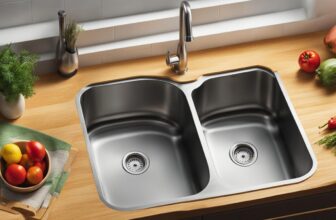Mouse Droppings in Kitchen? Clean-Up Guide & Tips
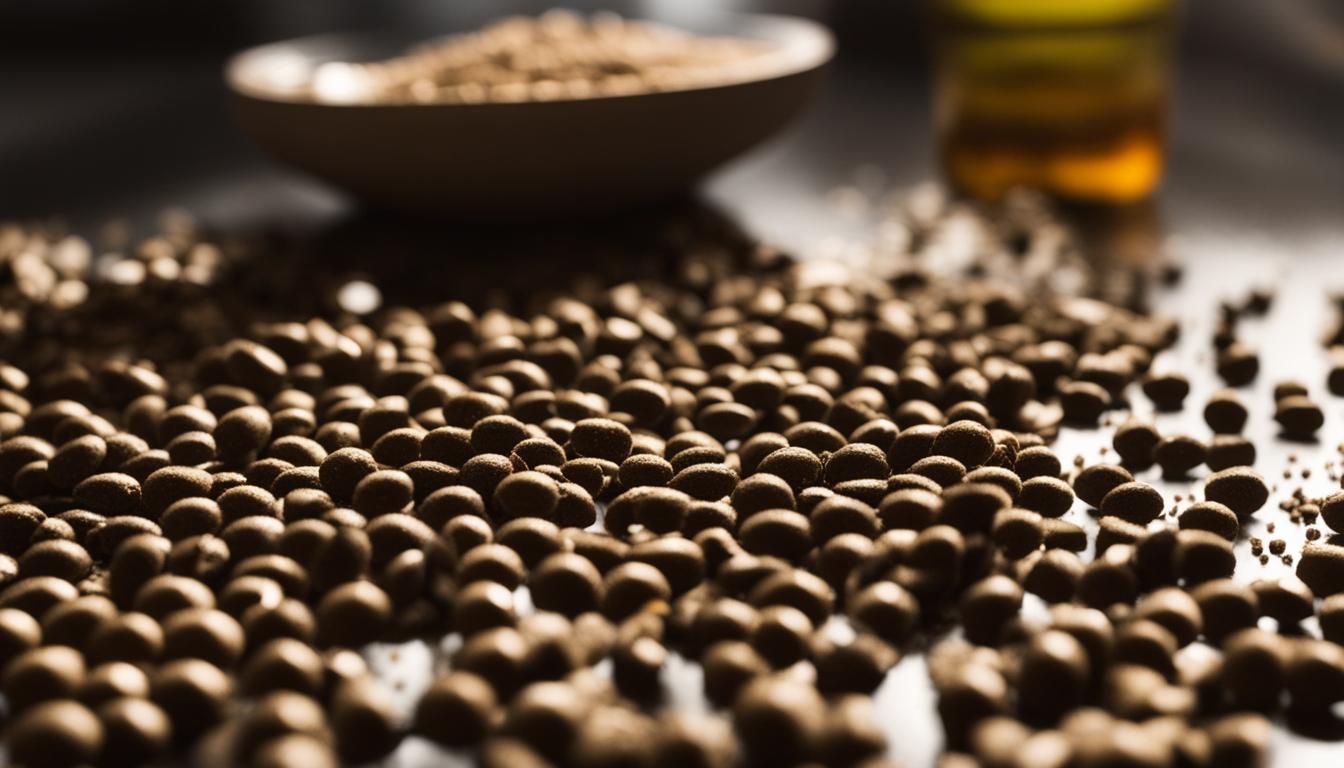
Discovering mouse droppings in your kitchen is not only unpleasant but also poses serious health risks. These feces carry harmful bacteria and can cause diseases, making it crucial to clean them up promptly and thoroughly.
In this article, we’ll provide you with a detailed guide on how to clean up mouse droppings in your kitchen, and share tips on preventing future infestations. From identifying the signs of mice in your kitchen to safe cleaning techniques, we’ve got you covered.
Key Takeaways
- Mouse droppings in the kitchen can be harmful to your health due to the bacteria they carry
- It’s essential to identify the signs of a mouse infestation early on to prevent further damage and health risks
- Proper clean-up techniques are necessary to ensure a safe and hygienic environment in your kitchen
- Prevent future mouse infestations by taking steps such as sealing entry points and storing food properly
- Natural remedies for mouse control can be used as an alternative to extermination services
Signs of Mice in Your Kitchen
Mouse infestations in your kitchen can cause serious health risks, so it’s crucial to identify the signs early on. Here are some telltale signs of mice in your kitchen:
- Presence of mouse droppings near food sources, cabinets, drawers, and appliances.
- Chewed-through food packaging, such as rice or cereal boxes.
- Scratching or scurrying sounds at night, especially in walls or behind appliances.
- Visible gnaw marks on wood, plastic, or wiring.
If you notice any of these signs, it’s essential to take immediate action to prevent further damage and health risks.
Health Risks of Mouse Droppings in Your Kitchen
The presence of mouse droppings in your kitchen can lead to serious health concerns. These tiny pellets carry harmful bacteria that can contaminate surfaces and your food. If not cleaned up promptly and properly, they can pose a threat to you and your family’s health.
Certain bacteria carried by mouse droppings can trigger diseases such as Hantavirus pulmonary syndrome, salmonellosis, and leptospirosis. Symptoms can range from fever and muscle aches to more severe conditions such as respiratory failure and kidney damage.
It’s crucial to protect yourself from these health risks. By cleaning up mouse droppings and taking preventive measures, you can ensure a clean and safe environment in your kitchen.

“The droppings of rodents can carry dangerous diseases and bacteria that can be harmful to humans. Proper cleaning and prevention are necessary to ensure the safety of your home.” – Pest Control expert, John Smith
The Clean-Up Process: Step-by-Step Guide
If you’ve discovered mouse droppings in your kitchen, it’s crucial to take immediate action and clean them up as soon as possible. Follow this step-by-step guide for a thorough and effective clean-up process:
Gather the Necessary Supplies
Before you begin cleaning, ensure that you have the following supplies:
- Rubber gloves
- Face mask
- Disposable paper towels
- Plastic bag
- Bleach or disinfectant spray
Taking Precautions
Put on the rubber gloves and face mask before starting the clean-up process. This will protect you from potential health risks associated with mouse droppings.
Disinfect the Area
Spray bleach or disinfectant onto the droppings and the surrounding area. Let it sit for at least five minutes to disinfect the surfaces effectively. Wear the face mask to prevent inhalation of any harmful particles.
Clean-Up Droppings with Paper Towels
Use disposable paper towels to pick up and dispose of the mouse droppings. Make sure to handle them with care. Place the used paper towels in a plastic bag and seal it tightly.
Disinfect the Area Once More
After the droppings have been removed, spray bleach or disinfectant on the cleaned surfaces and let dry.
Properly Dispose of the Materials
Seal the plastic bag containing the used paper towels and dispose of it safely in an outdoor trash can.
Remember, never vacuum or sweep mouse droppings, as this can spread harmful particles throughout the air.
Necessary Supplies for Cleaning Up Mouse Droppings
When it comes to cleaning up mouse droppings in your kitchen, having the right supplies on hand can make the process more efficient and effective. Here are the essential tools you’ll need:
| Supplies | Description |
|---|---|
| Disposable gloves | To protect your hands from harmful bacteria. |
| Face mask | To avoid inhaling dust and particles. |
| Bleach solution | To disinfect and sanitize the area. |
| Paper towels | To clean and wipe the surfaces. |
| Trash bags | To dispose of the droppings and contaminated materials. |
| Cleaning spray | To remove any remaining stains and smells. |
Remember to dispose of all contaminated materials safely and promptly. Seal the bags tightly and place them in an outdoor trash bin to prevent any further contamination.
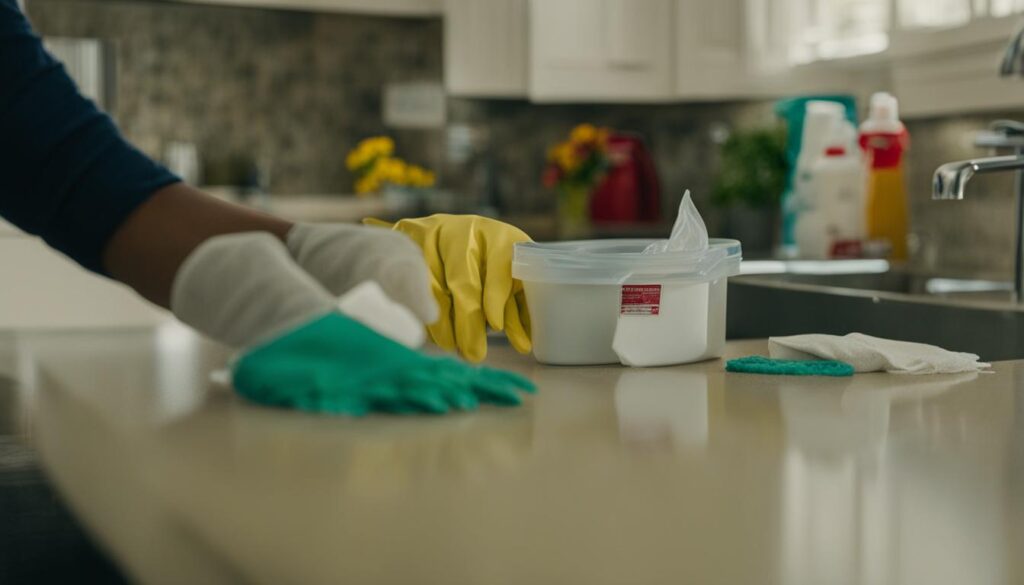
Safe Cleaning Techniques for Mouse Droppings
When cleaning up mouse droppings in your kitchen, it’s essential to prioritize safety to prevent the spread of harmful bacteria. Follow these techniques to ensure a hygienic environment:
- Wear protective gear. Wear gloves, an apron, and a face mask to avoid direct skin contact and inhalation of dust particles.
- Ventilate the area. Open windows and doors to allow proper air circulation.
- Maintain proper disposal practices. Place droppings and cleaning supplies in a plastic bag and tie it securely. Dispose of the bag outside in a covered trashcan.
- Use disinfectant. Use a bleach solution or a commercial disinfectant to clean surfaces and areas where mouse droppings were found. Follow manufacturer’s instructions for proper usage.
- Never sweep or vacuum droppings. Sweeping and vacuuming can cause dust particles to become airborne, increasing the risk of inhaling bacteria. Use a wet cloth or paper towel to clean droppings and dispose of it immediately.
Tip: To ensure a thorough clean-up, leave disinfectant on surfaces for at least five minutes before wiping it down with a wet cloth.
Precautions to Take During Clean-Up
While cleaning up mouse droppings in your kitchen, it’s crucial to take certain safety precautions to protect yourself from potential health risks. Here are some essential steps to follow:
- Wear protective gear: Before starting the clean-up process, ensure you wear protective gear such as gloves and a face mask. This will prevent direct contact with mouse droppings and potential inhalation of harmful bacteria.
- Avoid sweeping or vacuuming: Mouse droppings can spread harmful bacteria if swept or vacuumed. Instead, use a damp paper towel to carefully pick up droppings and dispose of them in the trash.
- Use a disinfectant: After removing all droppings, clean the entire area thoroughly with a disinfectant solution. This will kill any remaining bacteria and ensure a hygienic environment.
- Wash your hands: After completing the clean-up process, make sure to wash your hands thoroughly with soap and warm water.
Following these safety precautions will ensure that you clean up mouse droppings safely and effectively, without risking your health.
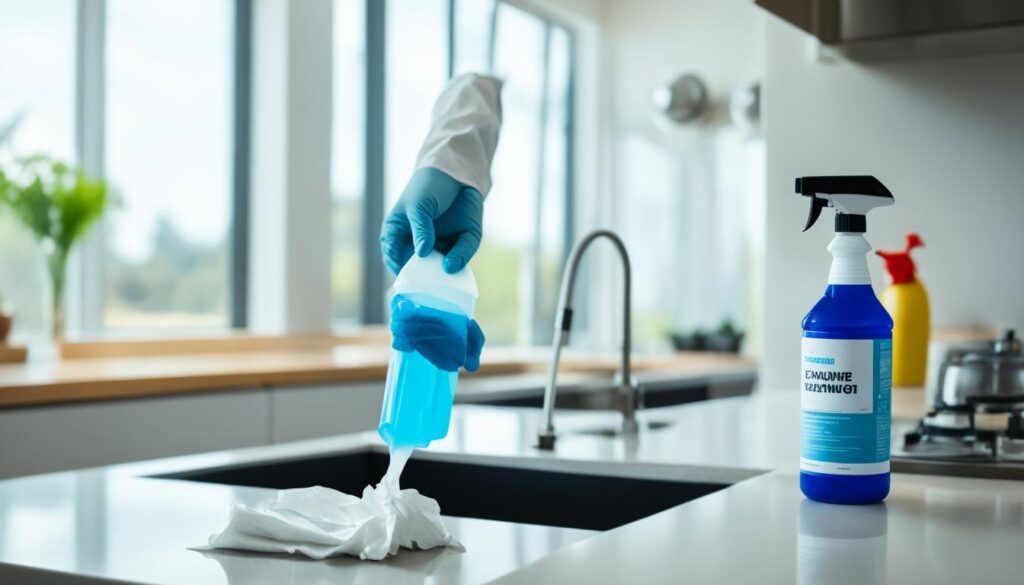
Preventing Future Mouse Infestations in Your Kitchen
Mouse infestations in your kitchen can be a nuisance and a health hazard. Use the following strategies to prevent future mice from taking up residence in your kitchen:
- Seal entry points: Mice can enter your kitchen through the smallest of holes. Be diligent about sealing points of entry, including windows, doors, and cracks in walls. Consider adding weather stripping and door sweeps to prevent gaps.
- Proper food storage: Keep food in sealed containers and off the countertops. Regularly clean up spills and crumbs that can attract mice.
- Regular cleaning: Be consistent with your cleaning routine, including wiping down countertops, sweeping, and mopping the floors.
- Eliminate moisture: Mice need water to survive, so make sure to eliminate sources of excess moisture in your kitchen.
By taking these preventive measures, you can reduce the likelihood of future mouse infestations in your kitchen. If you continue to have issues with mice, consider consulting with a professional exterminator.
Professional Extermination Services
If you have tried cleaning and preventive measures, but the mouse infestation in your kitchen continues, it’s time to seek the help of professional extermination services. These experts have the knowledge, experience, and equipment necessary to effectively get rid of mice in your home.
When choosing a professional extermination service, consider their experience, qualifications, and reputation. Look for reviews from other customers and ensure that the service is licensed and insured. Be sure to discuss the scope, timeline, and cost of the services offered before making a final decision.
While professional extermination services may be more expensive than DIY methods, they offer a long-term and permanent solution to mouse infestations. Plus, you can have the peace of mind that your kitchen is safe and free from mouse droppings.
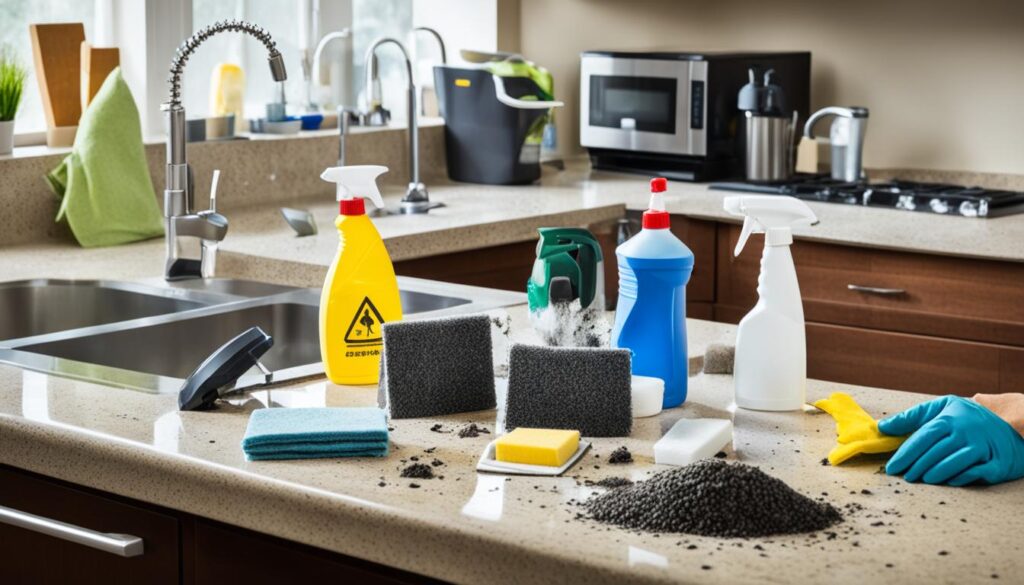
Benefits of Hiring Professional Extermination Services
- Effective mouse removal
- Expert knowledge and experience
- Long-term solution
- Peace of mind
Considerations for Hiring Professional Extermination Services
- Qualifications and experience
- Reputation and reviews
- Licensing and insurance
- Scope, timeline, and cost of services
“Hiring professional extermination services was the best decision I made to get rid of the mouse infestation in my kitchen. The experts were knowledgeable, efficient, and thorough, and now I have a clean and safe environment for my family.” – Jane Smith, happy customer.
Maintaining a Clean and Pest-Free Kitchen
After cleaning up any presence of kitchen mouse droppings or rodent droppings in your kitchen, it’s important to take preventive measures to maintain a clean and hygienic environment. Here are some practical tips to help keep your kitchen free of mice:
- Store food properly: Make sure all food is stored in airtight containers, including pet food, cereal, and snacks. Keep food off the counters and floors to avoid attracting mice;
- Clean up spills and crumbs: Wipe spills immediately and sweep any crumbs off the floor. Keep your counters and floors clean to avoid providing hiding or breeding places for mice;
- Take out the trash often: Dispose of any food waste promptly in tightly sealed garbage bags and take the trash out of the house regularly;
- Seal entry points: Close off any entry points by filling gaps around pipes, vents, door frames, and windows with appropriate materials to prevent mice from entering your home;
- Set mouse traps: Place mouse traps strategically in areas where you’ve noticed mouse activity to get rid of them before they reproduce and create an infestation.
Implementing these measures will go a long way in keeping your kitchen free from the nuisance of rodent droppings in the kitchen and creating a healthy living environment for you and your family.
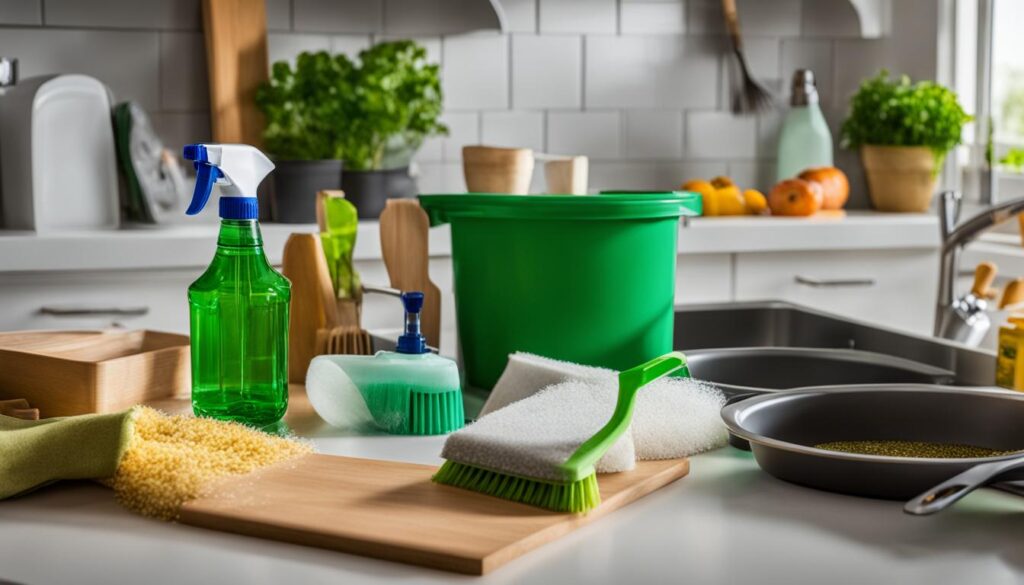
Natural Remedies for Mouse Control
If you’re looking for a more natural solution to deal with a mouse infestation in your kitchen, there are a few options you can try. These remedies are safe, effective, and better for the environment than harsh chemical pesticides.
Peppermint Oil
One natural remedy that is known to deter mice is peppermint oil. The strong scent masks the smell of food and makes it difficult for mice to navigate. To use peppermint oil, soak cotton balls in the oil and place them in areas where mice are likely to go, such as along walls and near entry points. Replace the cotton balls every few days to keep the scent strong.
Catnip
Another natural remedy that can be effective is catnip. Mice are repelled by the smell of catnip, so you can use it to create a barrier around your kitchen. Simply sprinkle dried catnip around entry points and areas where mice are likely to go. Be sure to replace it every few days to keep the scent fresh.
Ultrasonic Repellers
Ultrasonic repellers emit a high-pitched sound that is inaudible to humans but can be annoying to mice. These devices work by creating a hostile environment for mice, causing them to leave. Place ultrasonic repellers in areas where mice are likely to go, such as under sinks or behind appliances.
Steel Wool
If you have gaps or holes in your kitchen, mice can easily enter. To prevent this, use steel wool to plug up any gaps or holes. Mice cannot chew through steel wool, making it an effective barrier.
Avoid Mouse Inviting Environments
Finally, to prevent mice from infesting your kitchen altogether, make sure to keep it clean and free of clutter. Store food in airtight containers and clean up spills and crumbs immediately. Also, remove any unnecessary clutter that could provide a hiding place for mice.
Using these natural remedies can help deter mice and keep your kitchen free from mouse feces in kitchen and a mouse infestation in kitchen, in a safe and eco-friendly way.
Conclusion
Dealing with mouse droppings in your kitchen can be stressful, but with the right information and tools, it’s entirely manageable. Remember to identify the signs of a mouse infestation early on, so you can take immediate action to prevent further damage and health risks.
Mouse droppings carry harmful bacteria and can pose serious health risks, so it’s crucial to clean them up properly. Follow our step-by-step guide, using the necessary supplies and safe cleaning techniques to ensure a thorough and effective clean-up process.
Prevention is key to keeping mice out of your kitchen. By sealing entry points and practicing proper food storage, you can significantly reduce the risk of future infestations. Consider natural remedies for mouse control as an environmentally friendly option. If you’re dealing with a severe mouse infestation, professional extermination services may be necessary.
By implementing preventive measures and maintaining ongoing cleanliness and hygiene, you can create a safe, clean, and pest-free kitchen environment for you and your family. Don’t let mouse droppings take over your kitchen; take action today!
FAQ
What are the signs of mice in my kitchen?
Some signs of mice in your kitchen include mouse droppings, gnaw marks on food packaging or wires, a strong odor, and the presence of nests or chewed-up materials.
What are the health risks of mouse droppings in my kitchen?
Mouse droppings can carry harmful bacteria such as salmonella and hantavirus. Inhaling airborne particles from dried mouse urine or feces can lead to respiratory issues, while direct contact can cause diseases.
How do I clean up mouse droppings in my kitchen?
To clean up mouse droppings, you should wear protective gloves and a mask, wet the affected area with a disinfectant or bleach solution, carefully remove the droppings using disposable materials, and thoroughly clean the area afterward.
What supplies do I need to clean up mouse droppings in my kitchen?
The supplies you need include disposable gloves, a mask, paper towels or disposable rags, a disinfectant or bleach solution, a plastic bag for disposal, and a vacuum cleaner with a HEPA filter.
What precautions should I take during clean-up?
During clean-up, it’s important to avoid stirring up dust by wetting the area before cleaning, wearing protective gear, and avoiding direct skin contact with mouse droppings. Additionally, wash your hands thoroughly after handling droppings and dispose of them properly.
How can I prevent future mouse infestations in my kitchen?
To prevent future mouse infestations, you should seal any entry points, store food in airtight containers, eliminate hiding spots and food sources, and maintain cleanliness in your kitchen.
When should I seek professional extermination services for mice in my kitchen?
You should consider professional extermination services if you have a severe mouse infestation, if your DIY methods have proven ineffective, or if you’re concerned about your ability to safely handle the situation.
What are some natural remedies for mouse control in my kitchen?
Natural remedies for mouse control include using peppermint oil, placing mothballs or ammonia-soaked rags near entry points, keeping cats as pets, using ultrasonic devices, and setting up traps with non-toxic baits.
How can I maintain a clean and pest-free kitchen after cleaning up mouse droppings?
To maintain a clean and pest-free kitchen, you should continue practicing good hygiene, regularly inspect and clean your kitchen, seal any potential entry points, and immediately address any signs of a new infestation.
Is it necessary to clean mouse droppings in my kitchen immediately?
It is essential to clean mouse droppings in your kitchen as soon as possible. The longer the droppings remain, the higher the risk of bacteria and disease spreading, and the higher the chance of attracting more mice.





